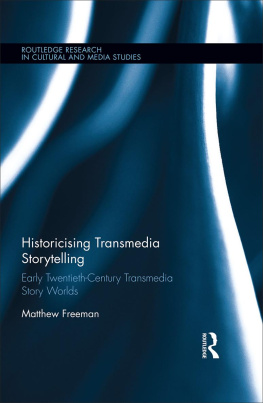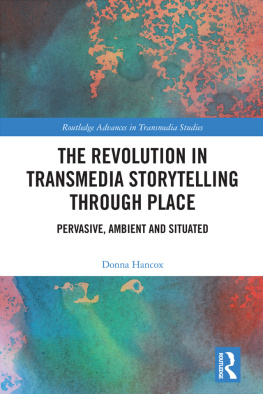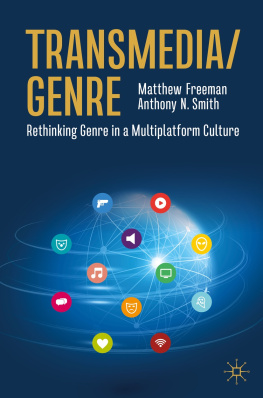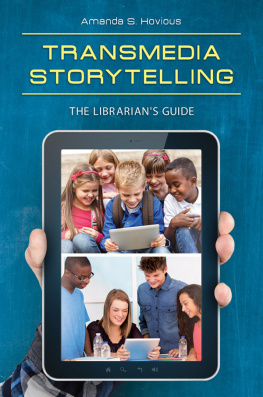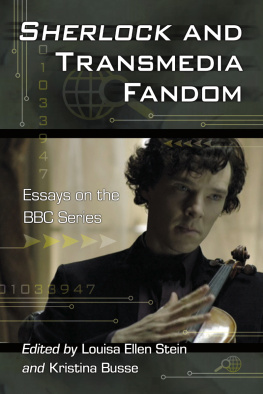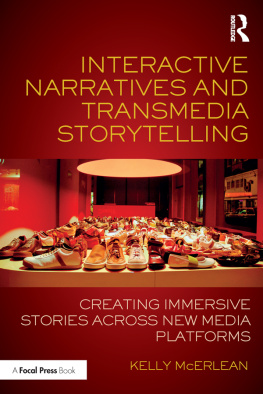TRANSMEDIA WORK
In Transmedia Work Karin Fast and Andr Jansson explore several key questions that frame the study of the social and cultural implications of a digital, connected workforce.
How might we understand privilege and precariousness in todays digitalized work market? What does it mean to be a privileged worker under the so-called connectivity imperative? What are the social and cultural forces that normalize the appropriation of new media in, and beyond, the workplace? These key questions come together in the notion of transmedia work a term through which a social critique of work under digital modernity can be formulated. Transmedia work refers to the rise of a new social condition that saturates many different types of work, with various outcomes. In some social groups, and in certain professions, transmedia work is wholeheartedly embraced, while it is questioned and resisted elsewhere. There are also variations in terms of control; who can maintain a sense of mastery over transmedia work and who cannot?
Through interviews with cultural workers, expatriates, and mobile business workers, and ancillary empirical data such as corporate technology and coworking discourse, Transmedia Work is an important addition to the study of mediatization and digital culture.
Karin Fast is Senior Lecturer in Media and Communication Studies and part of the Geomedia Research Group, Karlstad University, Sweden. Her work on labour, mediatization, transmediality, and cultural industries has been published in numerous journals, including Communication Theory; Media, Culture & Society and International Journal of Cultural Studies.
Andr Jansson is Professor of Media and Communication Studies and Director of the Geomedia Research Group at Karlstad University, Sweden. His most recent books include Mediatization and Mobile Lives: A Critical Approach (2018) and Cosmopolitanism and the Media: Cartographies of Change (2015, with M. Christensen).
First published 2019
by Routledge
2 Park Square, Milton Park, Abingdon, Oxon OX14 4RN
and by Routledge
52 Vanderbilt Avenue, New York, NY 10017
Routledge is an imprint of the Taylor & Francis Group, an informa business
2019 Karin Fast and Andr Jansson
The right of Karin Fast and Andr Jansson to be identified as authors of this work has been asserted by them in accordance with sections 77 and 78 of the Copyright, Designs and Patents Act 1988.
All rights reserved. No part of this book may be reprinted or reproduced or utilised in any form or by any electronic, mechanical, or other means, now known or hereafter invented, including photocopying and recording, or in any information storage or retrieval system, without permission in writing from the publishers.
Trademark notice: Product or corporate names may be trademarks or registered trademarks, and are used only for identification and explanation without intent to infringe.
British Library Cataloguing in Publication Data
A catalogue record for this book is available from the British Library
Library of Congress Cataloging-in-Publication Data
A catalog record has been requested for this book
ISBN: 978-1-138-30112-2 (hbk)
ISBN: 978-1-138-30113-9 (pbk)
ISBN: 978-0-203-73274-8 (ebk)
This book is an attempt to bring together debates, areas, and topics that we together or individually have been working with over the past years. In various projects, we have explored questions pertaining to mediatization, work, transmedia, space/place, power, and identity. Originally, our intention was to scrutinize what we ourselves experienced as an increasingly liquid work environment and to problematize notions of privilege and precariousness under mediatized work conditions. While we eventually came to shift our focus from liquid work to transmedia work, our interest in the increasingly conflictual relationship between privilege and precariousness in digital modernity remains.
The projects that we have been engaged in, and from which most of the empirical data of this book emanate, are the following: Rural Networking/Networking the Rural: Participatory Culture and Civic Communities in the Swedish Countryside (funded by the Research Council Formas, 20082013, Jansson); Kinetic lites: The Mediatization of Social Belonging and Close Relationships among Mobile Class Fractions (funded by the Swedish Research Council, 20122015, Jansson and Fast), Music Innovation Network Inner Scandinavia (MINS) (funded by the European Union, Interreg Sweden-Norway, 20152018, Fast), and In-Between Spaces: Digital Media Geographies and Social Transformations in Small Towns (funded by Karlstad University, 20172020, Jansson and Fast). We want to thank all colleagues that we have worked with in these projects, including Magnus Andersson, Miyase Christensen, Jessica Edlom, Jenny Jansdotter, Johan Lindell, Linda Ryan Bengtsson, Mia Toresson Runemark, Mekonnen Tesfahuney, and Henrik rnebring.
We also want to express our gratitude to those outside of our projects who have provided valuable comments to bits and pieces of our manuscript and associated discussions. Thank you Paul C. Adams, Stina Bengtsson, Ann Bergman, Gran Bolin, Mark Deuze, Olivier Driessens, Matthew Freeman, Sara Hamqvist, Maren Hartmann, David Hesmondhalgh, Kristoffer Holt, Maja Klausen, Ulf Mellstrm, Erika Polson, Marcus Prest, Renira Rampazzo Gambarato, Toke Riis Ebbesen, Gillian Rose, Scott Rodgers, Jenny Sundn, Crispin Thurlow, John Tomlinson, and Barbie Zelizer. A special thanks also to the anonymous reviewers of this work.
We are grateful to all colleagues at the Department of Geography, Media and Communication at Karlstad University, Sweden, who have provided backing on a daily basis in the lunchroom, corridors, and by our doorposts. The Geomedia Research Group constitutes a reliable source of support, community, and critique: thank you to each and every fellow Geomedian, at Karlstad University or elsewhere in the world. Henrik rnebring, Mekonnen Tesfahuney, and Linda Ryan Bengtsson: we appreciate the particular interest that you have shown in our book project.
At Routledge, we want to thank Sheni Kruger, Natalie Foster, and Jennifer Vennall for making this book possible and for smooth cooperation throughout the process.
Last but not least, we want to thank our families for providing ground service, joy and regular reality checks.
To some extent, this book comprises discussions that have appeared in previous publications. These are:
Jansson, A. (2018). Mediatization as a framework for social design: For a better life with media, Design & Culture, DOI: 10.1080/17547075.2018.1511140. (Parts of this article have been reworked and incorporated in .)
Jansson, A. & Fast, K. (2018). Transmedia identities: From fan cultures to liquid lives. In Freeman, M. & Rampazzo Gambarato, R. (Eds.) The Routledge Companion to Transmedia Studies. London: Routledge. (Parts of this chapter have been reworked and incorporated in .)
Fast, K. (2018). A discursive approach to mediatisation: Corporate technology discourse and the trope of media indispensability, Media and Communication 6(2): 1528. (Parts of this article have been reworked and incorporated in .)
Fast, K. & Lindell, J. (2016). The elastic mobility of business elites: Negotiating the Home and Away continuum. European Journal of Cultural Studies 19(5), 435449. (Parts of this article have been reworked and incorporated in ).



